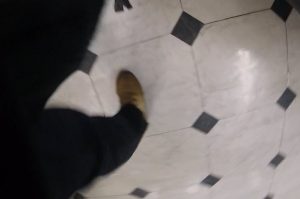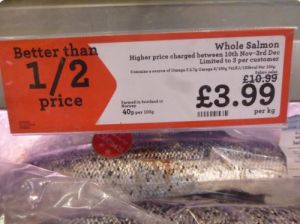Breaking news: We were surprised to see a tweet this week promoting whole salmon at £3.99/kg, an offer of more than half price. The reason why we were surprised was that we spend a lot of time in stores and had not seen this offer anywhere. As we discussed last week, the best offer so far this Christmas is whole salmon prices at £4.97/kg. This new tweet put the price at a £1/kg lower.
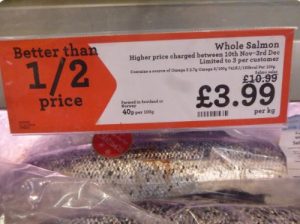
The image was posted by one of the regular tweeting anti-salmon farm critics, which made us take a second look. It didn’t take us long to work out that this was just another example of the misinformation circulated by those who oppose salmon farming. The picture was taken in December 2014 so represents a promotion that occurred four years ago.
It’s a shame that those who are motivated to fight against salmon farming are selective in using images or facts that fit their claims. In this case, they maintain that farmed salmon is now so cheap that production methods must be compromised to maintain profitability. As we discussed last week, retail prices have nothing to do with producers and are set by the supermarkets.
School dinners: A couple of months ago, the Daily Telegraph lifestyle section met chef Nicole Pisani, who grew up in Malta. She had just launched a new cookbook which is why she featured in the newspaper. However, buried deep in the article about her, was something of much more interest than her cookbook.
She had been working long hours at one of Yottam Ottolenghi’s London restaurants, but she noticed a tweet from Henry Dimbleby, the school meals campaigner and co-founder of the Leon restaurant chain in which he mentioned that the school which his children attended was looking for a chef. She has spent the last three and a half years coaxing 500 children to eat whole fillets of hake. She said that when she started all the fish was covered in breadcrumbs and fried. However, she started to replace the ready bought coated fillets with fresh fillets that she coated herself with panko breadcrumbs. Then she says, she took off the breadcrumbs and called it naked fish, which amused the children and seemed to make it more approachable. Now she serves fresh hake in a tomato sauce.
We are prompted to write about Nicole as she appeared on BBC’s Saturday Kitchen to talk about her experience but more importantly to mention the new charity Chefs in Schools which aims to appeal to those working in restaurants but who are looking for a career change.
We don’t think it is the only answer to reversing the declining consumption of fish and seafood but the more we encourage young people to eat and enjoy fish the more they will continue to eat fish outside school.
Chefs in schools have a website but on looking, we found that there is a similar initiative in Scotland – Chefs at School which is funded by the Scottish Government and administered by the Federation of Chefs Scotland.
We hope that both organisations can make an impact and where it really matters.
Increasing climate: BBC News published an article explaining climate change in seven charts. The last of these caught our attention because it focused on what the individual can do to help. The single change recommended to help reduce the impact on climate is to modify the food you eat, with a primary aim, according to recent studies, of reducing the amount of meat consumed. However, the chart used to illustrate this change is misleading, and for more than one reason.
Firstly, it is misleading to suggest that reducing meat consumption will help the planet when the graph clearly shows that beef is the main problem. By comparison, pork is relatively low impact with its highest production value still below that of the best beef production.
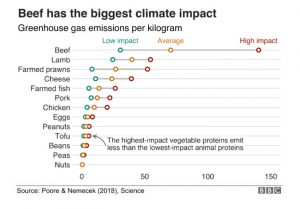
What is also surprising is that farmed fish comes above pork and chicken and that farmed prawns are even higher. We have looked at the original source material from Poore and Nemecek that was published in Science and we can only conclude that they have lumped all types of aquaculture except prawns in one. This means farmed fish includes both extensive pond production of warmwater omnivorous fish such as carp as well as net pen production of salmon. Clearly, they are not the same and could have very differing carbon footprints. It might be assumed that extensive pond production would have a lower carbon footprint than salmon farming but according to this study this is not the case. Warmwater pond culture usually involves the fertigation of ponds by animal manures and the breakdown of these is seem as a significant contribution to greenhouse gases.
By comparison, salmon farming has one of the smallest carbon footprints of any protein farming. Writing in the Vancouver Sun, John Paul Fraser of BC Salmon Farmers points out that salmon emit only 2.2 kilograms of carbon dioxide for every kilo of edible fish produced. Chicken produces 5.1kg, pork 6.4kg and beef 37.2kg. There is a massive difference between these proteins, which is not clear from the BBC chart.
Unfortunately, the number of people reading the Vancouver Sun will pale into insignificance compared to the international audience who read the BBC. It is easy to see how data is easily misinterpreted. Those reading the BBC will think that farmed salmon is not as good choice as it should be. This is the problem of applying global figures to local producers.
Anti-anti: The recurring message from wild fish and environmental interests is that there is only one solution to the issues about which they are concerned relating to salmon farming and that is that salmon farming must be moved from net pens in the sea to closed containment, especially on land. As far as they are concerned there is no other solution. They cite the planned new farm in Maine as an example of the future vision for the salmon farming industry.
But.
The Boston Globe reports that whilst the new farm would bring cash and jobs to the area, it is sparking local protest. An increasingly vocal group of local opponents say that city officials have been seduced by the project’s potential economic benefits are at the risk of hard-fought environmental improvements that have helped make Penobscot Bay one of the richest fishing grounds in the world. Posters have started to appear staying ‘Nordic go home’ and ‘No waste in our bay’.
Opponents are concerned that the plant will use massive amounts of water, which they worry will deplete local aquifers and they are concerned that digging trenches for the outfall pipe will disturb mercury deep in the sediment from previous pollution. They also believe that faecal matter and other effluent will carry substantial amounts of nitrogen and other chemicals into the bay and which could harm fish and cause toxic algal blooms.
Organiser for ‘Local Citizens for Smart Growth’, Ellie Daniels told the Boston Globe that when you start to look at the large-scale realities of the concentrated industrial activity there is just no avoiding serious environmental consequences. She added that ‘our primary concern is that this a concentrated animal feeding operation that poses very real threats to our environment and to our natural resources.
Some local fishing groups also oppose the new farm claiming that bleach, methanol and other chemicals from the plant that are discharged into the bay that could harm local fish and seafood. They say any tainted seafood could put their entire industry at risk. A representative form the Maine Lobstering Union said that any contamination could damage the reputation of the Maine Lobster brand and that would be terrible.
We, at Callander McDowell find it strange that there is such opposition to this RAS closed containment farm, which after all is seen as the panacea to the problems of the net pen farming. After-all there is little proof that RAS closed containment farming will damage the environment. However, after forty years of net pen farming off the coast of Scotland, there is little proof of any environmental disaster yet, the antis continue to complain. We have always said that if a salmon farming company submitted plans for a land-based farm, say near Lamlasch Bay, there would be just as much protest. They just want the west coast to be a museum rather than home to a healthy vibrant community.
Counselling: Congratulations to Alex McInnes, new councillor for Wester Ross, Strathpeffer and Lochalsh. The First Minister tweeted that he will be a brilliant councillor and a great addition to the Highland Council.
Unfortunately, not everyone seems to share the First Minister’s views. The anti-salmon farm lobby have been actively tweeting about the result saying that this is a very sad day for wild salmon, seals and the environment. This is because Alex is involved in the salmon farming industry. The implication is that Alex cares more about promoting salmon farming than the local community in which he lives.
How wrong they can be. Alex is a local person who cares passionately about his community and the environment and who cares enough to want to do something to help. By comparison the anti-tweeters see bad in anything and everything but do nothing other than sit behind their computer screens sniping and criticising. If they care enough about wild salmon, seals and the environment, they should get off their backsides and do something, like Alex has chosen to do.
Simply, they should put up or shut up.
An example of one of the tweets was: ‘It’s a free ticket to polluting the coastline with his very own salmon farm. Sad’. No not sad just pathetic.
Who is paying?: Anti-salmon farming critic, Don Staniford, has been posting videos about his travels through the Scottish salmon industry. His latest effort was filmed outside Billingsgate Market in London’s docklands. As can be seen from the image taken from the video, the focus of Mr Staniford’s attention is a rubbish bin and a fish box that looks as if it has been staged.
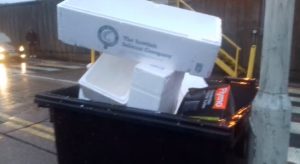
Mr Staniford appears to like looking through rubbish bins since most of his videos taken around farms also involve looking in the waste bins. We presume that Mr Staniford can video even a few dead fish, then he can argue his case.
These recent videos are part of Mr Staniford’s latest attempt to undermine the salmon farming industry. He wanted to follow others in to videoing alleged contraventions of the code of good practice. To this end, Mr Staniford recently attempted to raise £5,000 through crowdfunding to pay for his travel around Scotland. After the thirty-day funding period Mr Stanford only managed to raise about £1,500 of the total so he relisted and after a second attempt, the sum increased to a final amount of £1,595 or a third of the amount requested.
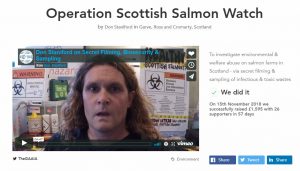
Clearly, Mr Staniford does not have the support of the public that the noise he creates suggests. In fact, our interest in his crowdfunding activity relates more to the question of how Mr Staniford funds his wider anti-salmon farming activities and even his life in general.
We, at Callander McDowell, have asked many times previously how Mr Staniford is funded. We did once receive an answer – public subscription. However, the fact that Mr Staniford only managed to raise £1,595 from a supportive public suggests that this is not the case. We cannot see that enough people donate to Mr Stanford’s cause to maintain his full-time activity.
Mr Staniford was living in the Wirral near his home town of Liverpool, but his crowdfunding page indicates he is now based in Garve near Inverness. He can’t move about without significant funding. The question is who is paying the bills?
One of Mr Staniford’s main ways of attacking the salmon farming industry is through Freedom of Information requests. These are a cheap way of finding things out since the Scottish taxpayer is left to foot the bill. Mr Staniford is a keen exponent of Freedom of Information, except when it comes to himself and then he becomes extremely secretive especially when it comes to funding.
Whilst, Mr Staniford is keen to promote himself as a local organisation – Scottish Salmon Watch rather than his usual Global Alliance Against Industrial Aquaculture, the fact is that Mr Staniford does have links abroad.
Our concern is that Mr Staniford is secretively being funded by others with their own agenda. The big US charitable foundations have a history of funding campaigns against salmon farming. It is possible they are the people keeping Mr Staniford afloat? Mr Staniford should stop hanging around rubbish bins and come clean as to who is paying his bills.
Update: Mr Staniford has posted another video recorded during his London trip. This was taken outside Selfridges, the Oxford Street department store. He says on the video that the farmed salmon is not properly labelled in high end stores such as Selfridges and M&S (who have a store on the opposite side of the road). He therefore said he is going to do some hidden camera work to show the real story of Scottish salmon.
He headed to the smoked salmon display and tells his audience that they are all produced form farmed salmon. He said that they are being sold at an astronomic price of £47. However, close examination of the label on the video shows that the large pack weights 1000g making the smoked salmon £47/kg which is neither astronomic in price or even expensive. The salmon is smoked by a specialist London smoker, with whom Mr Staniford was clearly unfamiliar so he moved on quickly.
Mr Staniford also directed his camera at the fish counter and managed a quick glimpse of a whole Loch Duart salmon (clearly labelled as such), probably before being told to stop filming.
Having watched the video, we are not sure which salmon products he showed were incorrectly labelled, nor what was the real story he had to tell.
The most impressive aspect of Mr Staniford’s video was how much of it featured Mr Staniford’s shoes and Selfridge’s Food Hall’s tiled floor!
